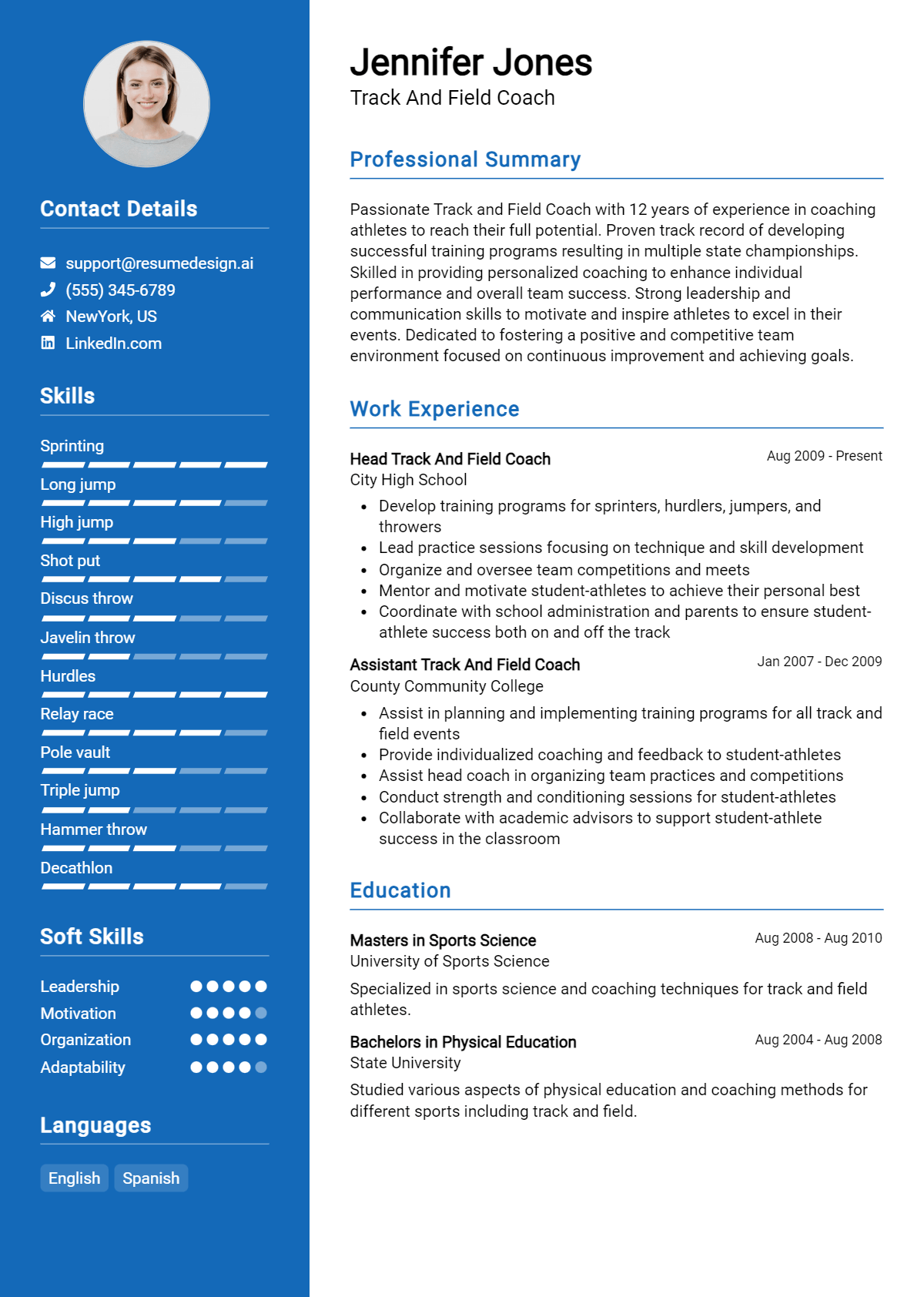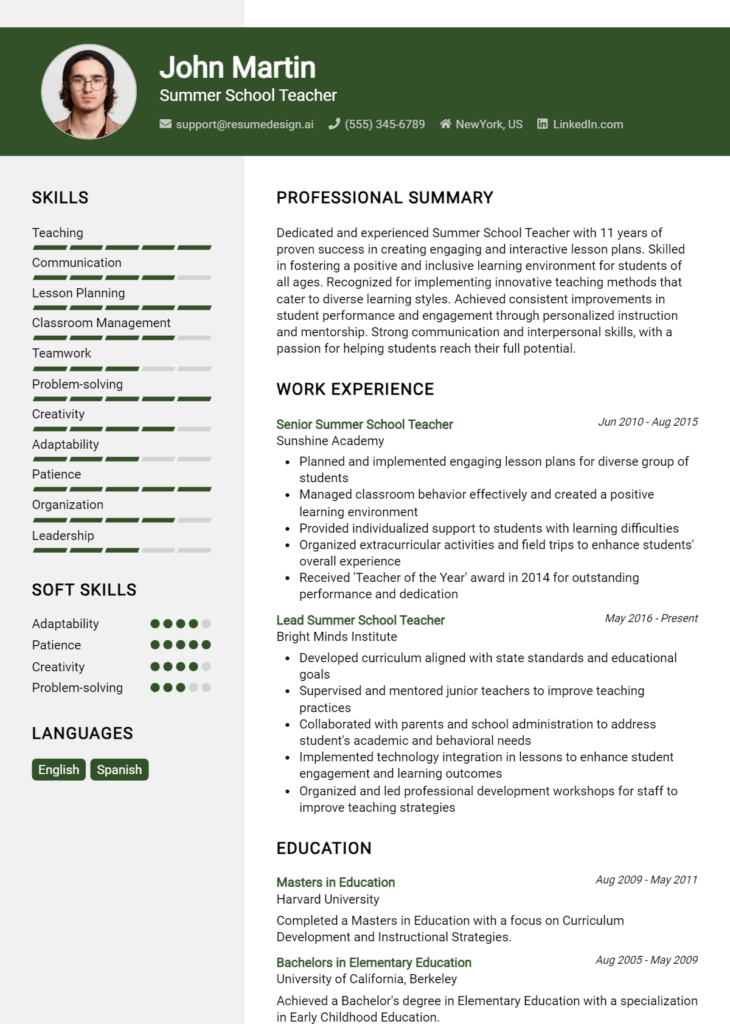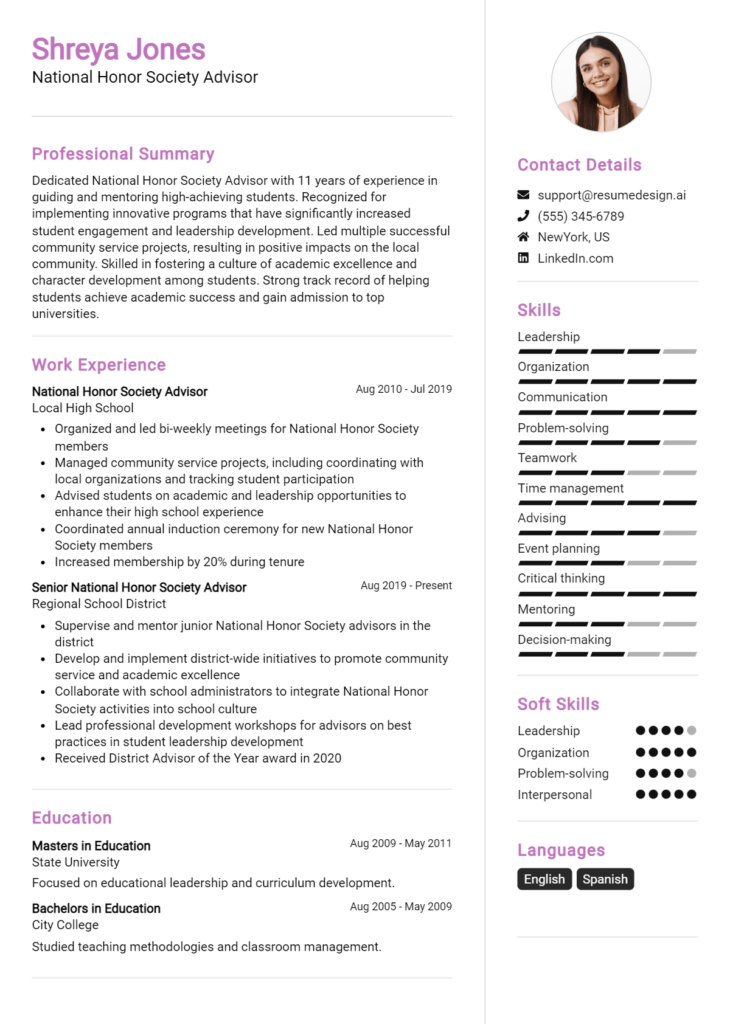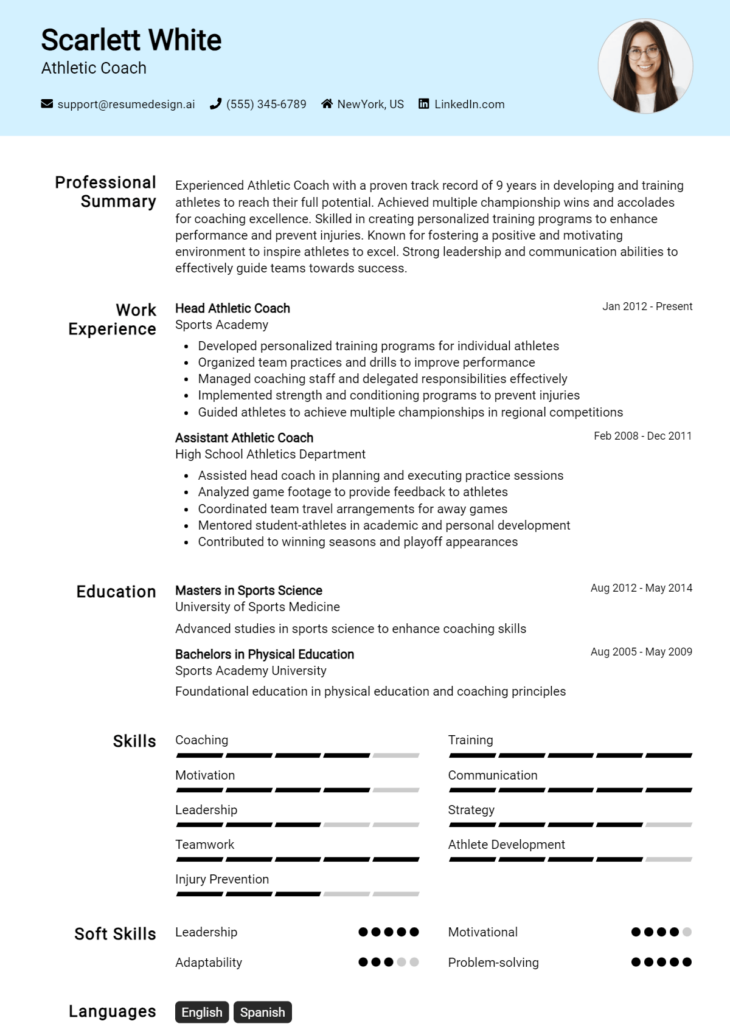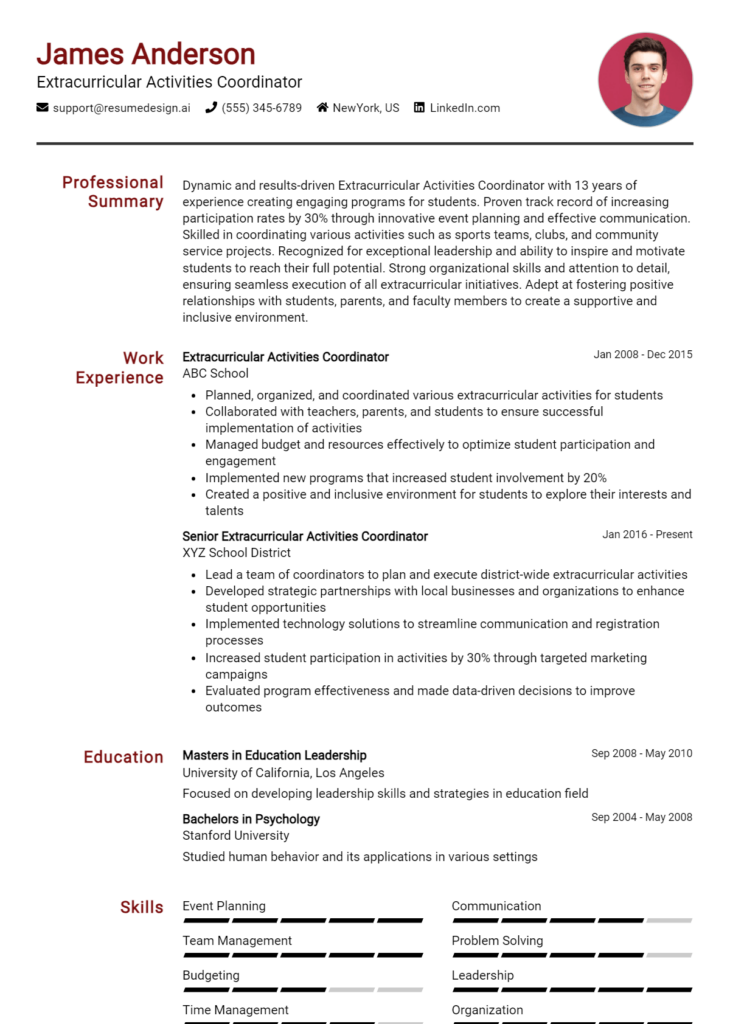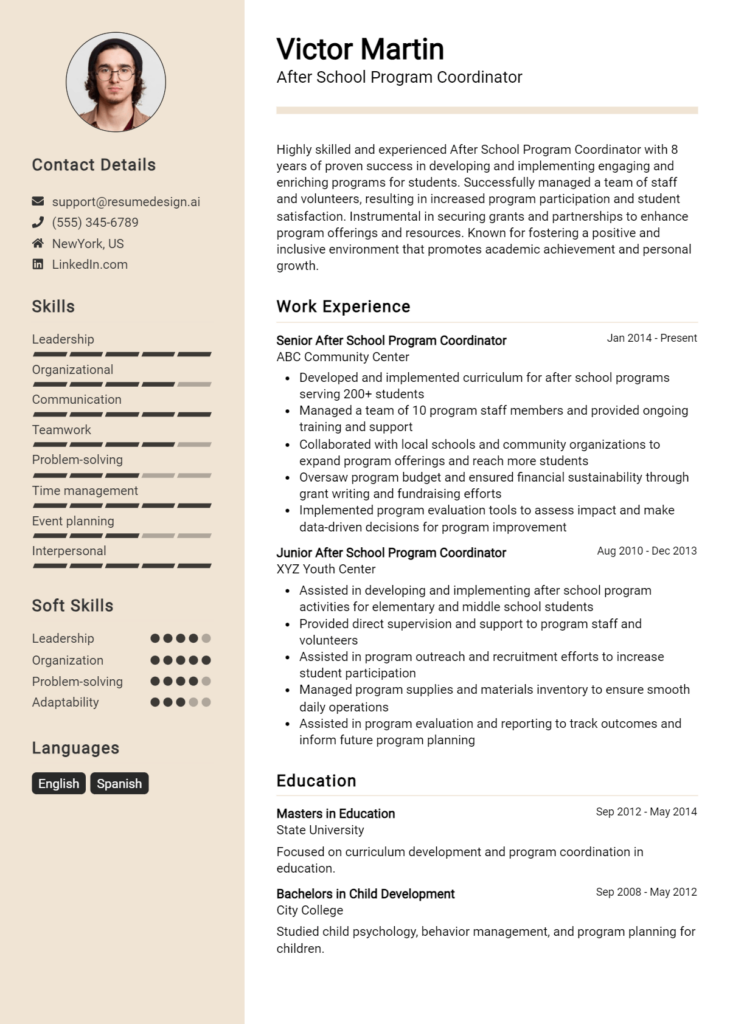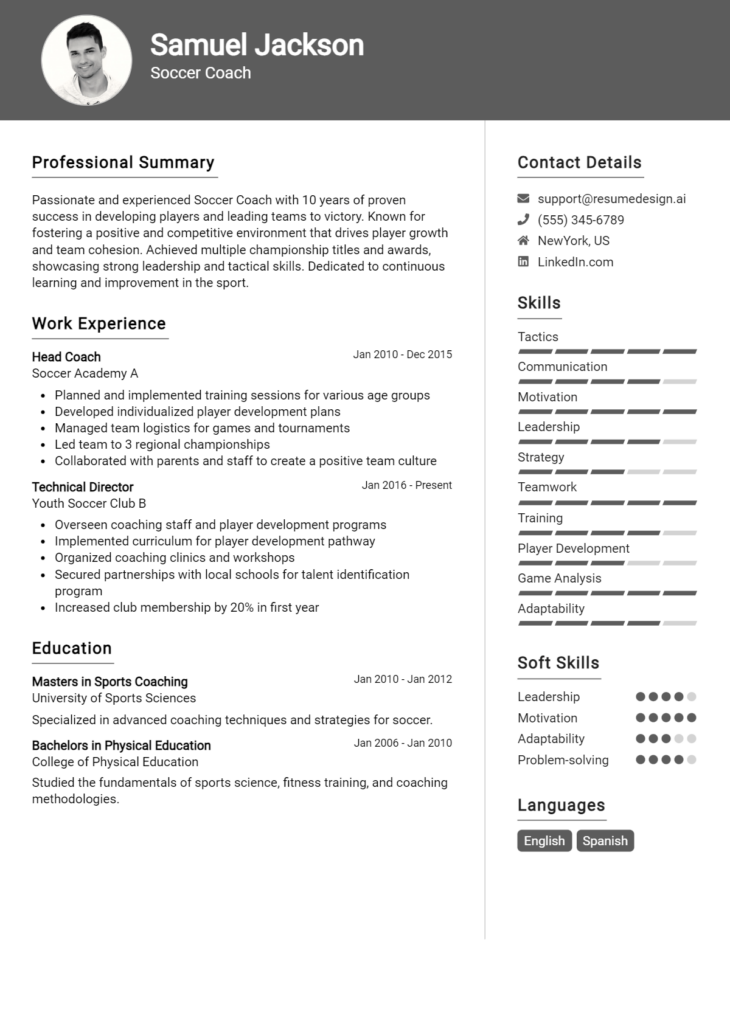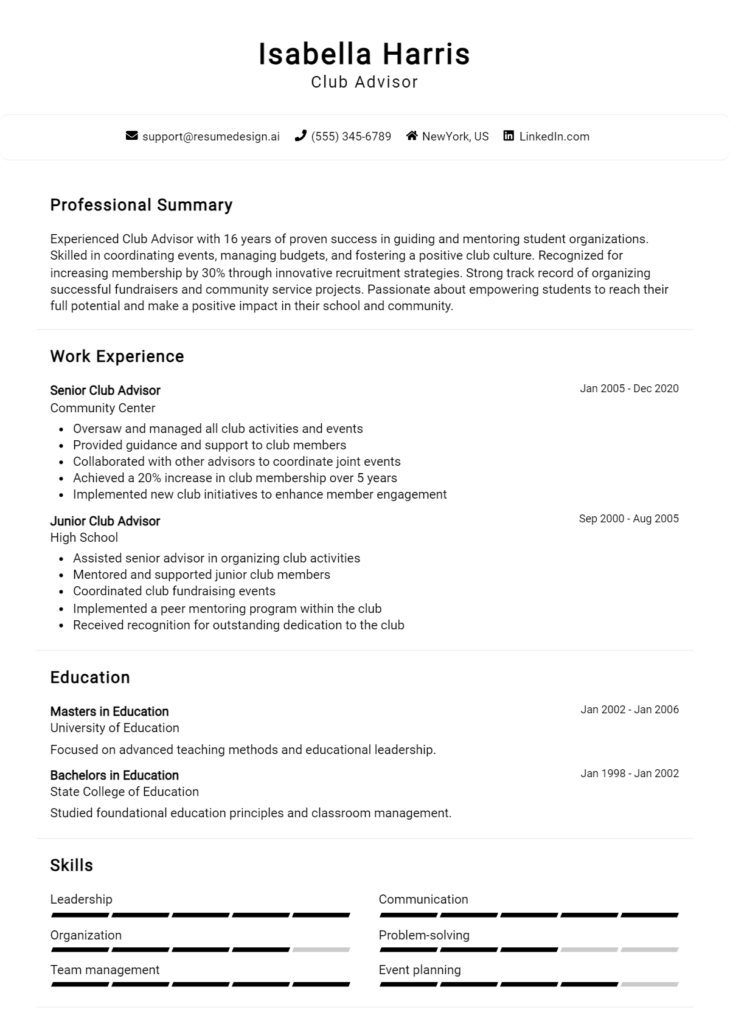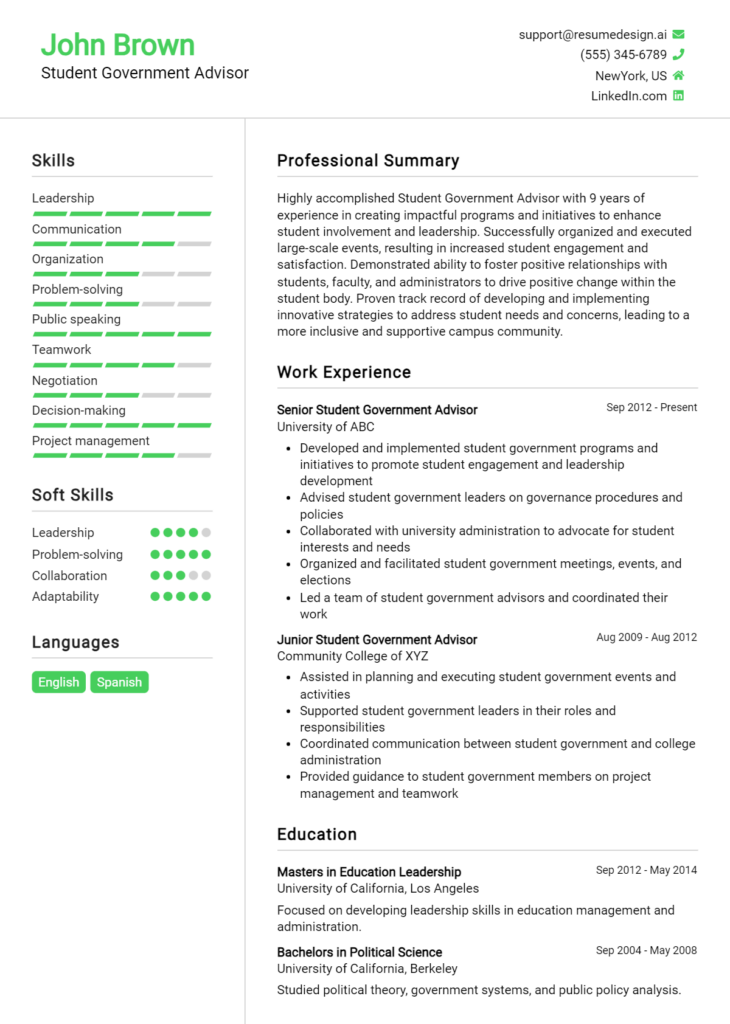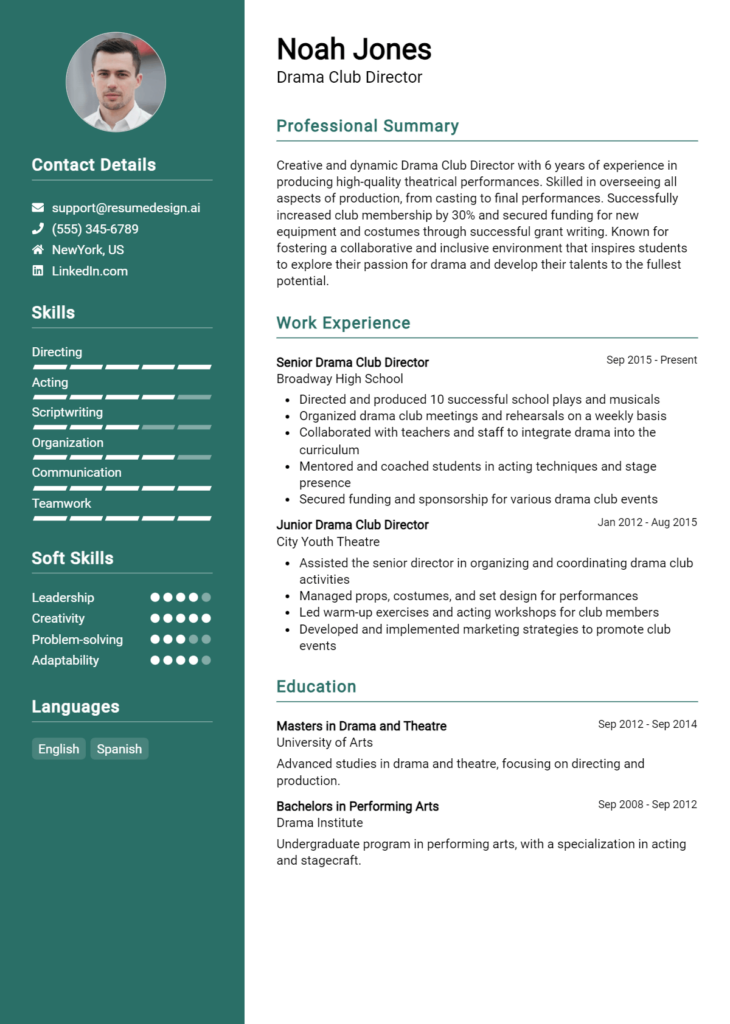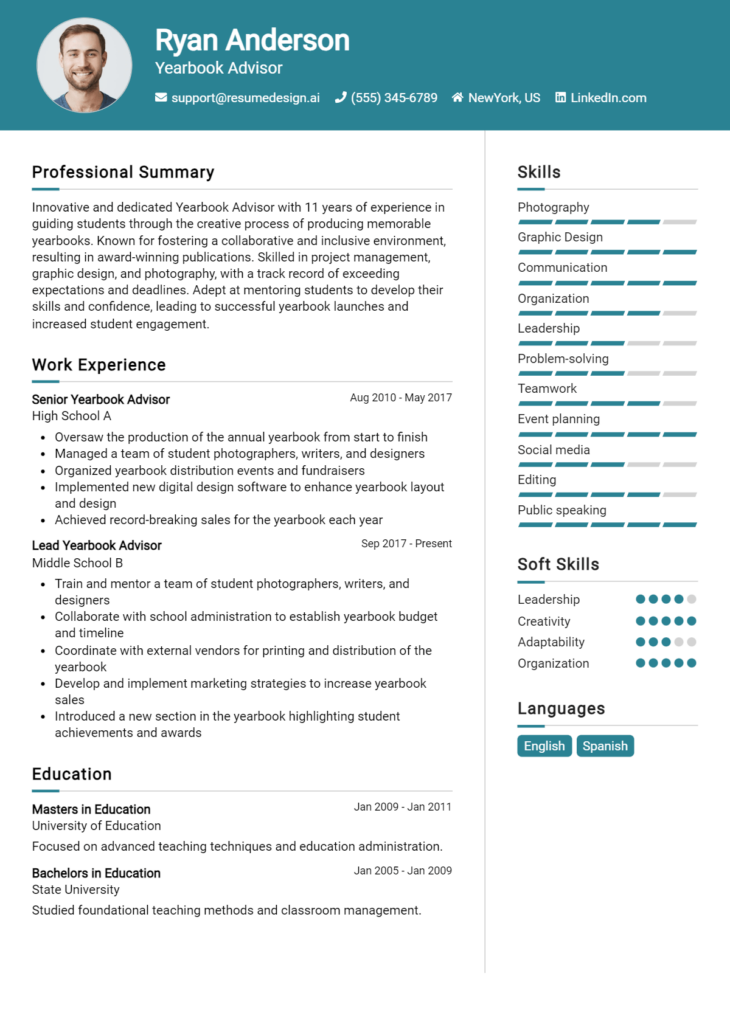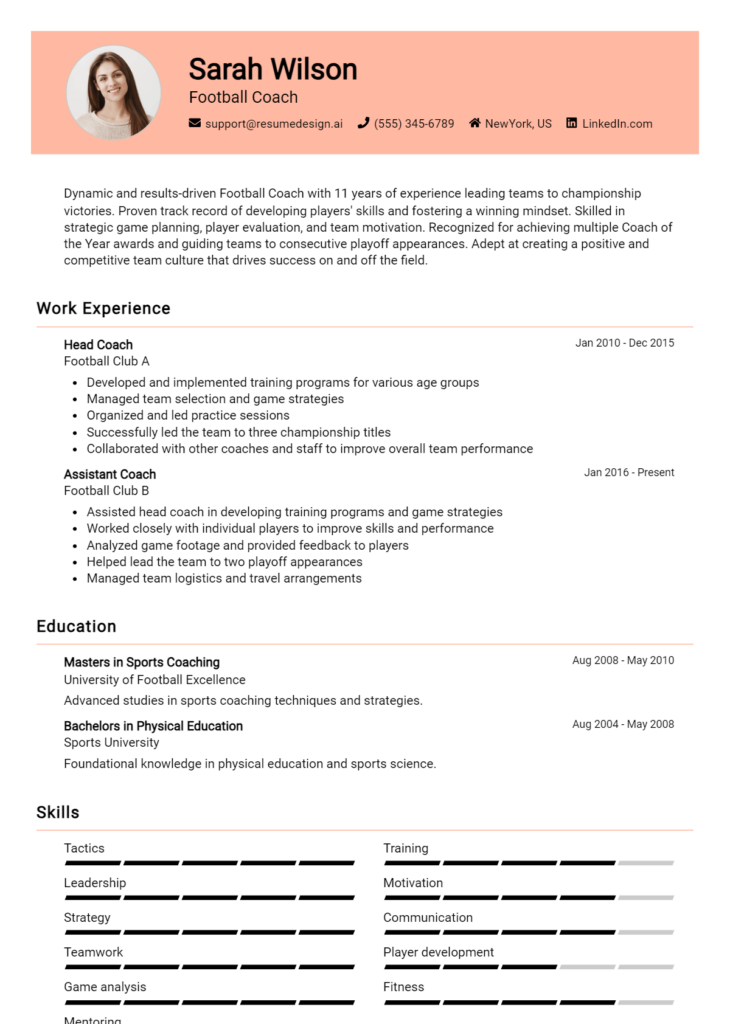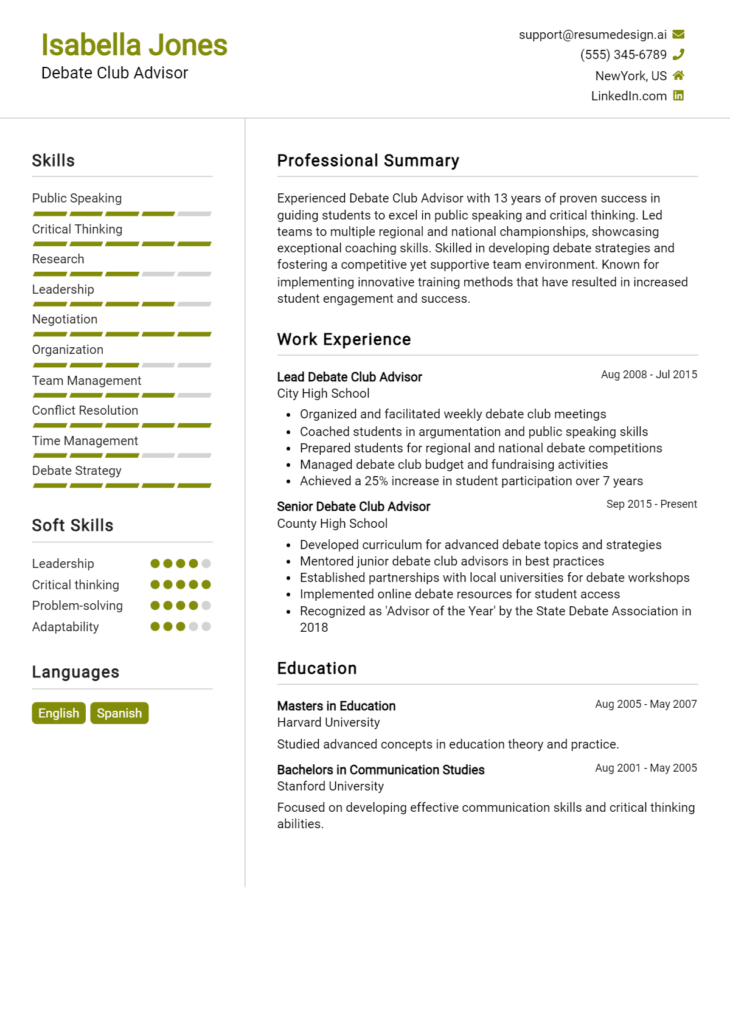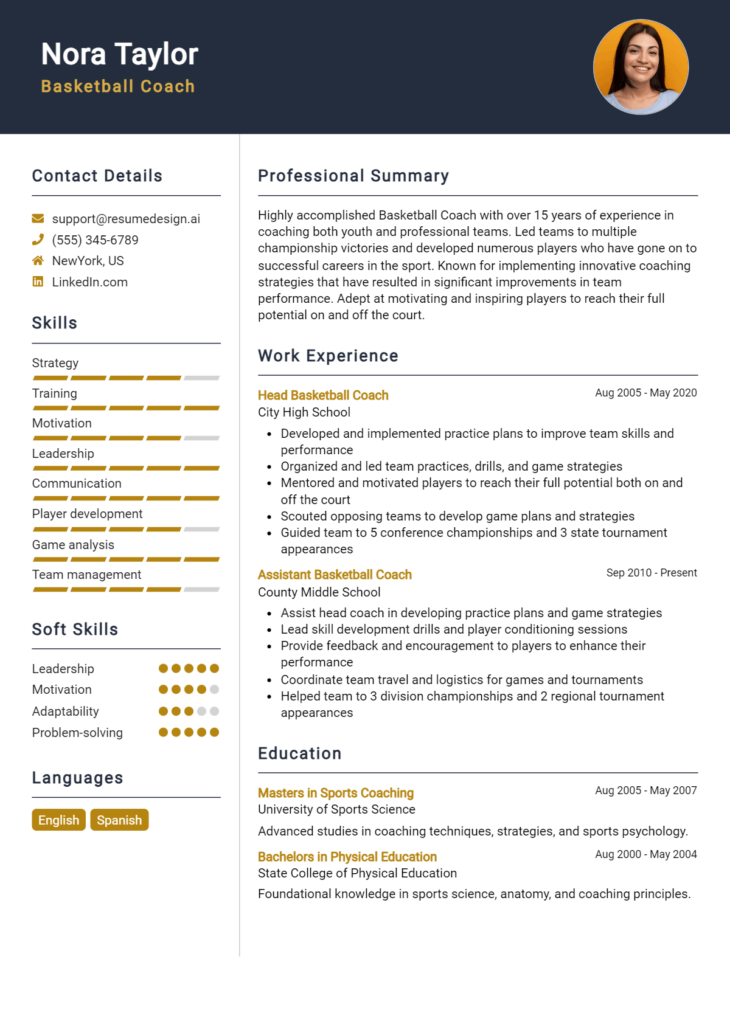Track and Field Coach Core Responsibilities
A Track and Field Coach plays a crucial role in developing athletes' skills and fostering a competitive environment. Key responsibilities include designing training programs, analyzing performance metrics, and coordinating with medical staff for athlete well-being. This role requires technical expertise in various track and field events, strong operational management skills for scheduling and logistics, and problem-solving abilities to address athlete challenges. These competencies contribute to the organization's success, making a well-crafted resume essential to showcase such qualifications effectively.
Common Responsibilities Listed on Track and Field Coach Resume
- Develop individualized training plans for athletes
- Monitor and assess athlete performance and progress
- Conduct skill-specific drills and workouts
- Organize and lead team practices
- Coordinate transportation and logistics for meets
- Communicate effectively with athletes, parents, and staff
- Implement injury prevention and rehabilitation strategies
- Analyze competition results to inform training adjustments
- Foster a positive team culture and sportsmanship
- Recruit and evaluate potential athletes
- Stay updated on trends and techniques in track and field
- Assist in fundraising and promotional activities for the program
High-Level Resume Tips for Track and Field Coach Professionals
A well-crafted resume is crucial for Track and Field Coach professionals, as it often serves as the first impression a candidate makes on potential employers. In a competitive field, your resume must effectively showcase your coaching skills, relevant experiences, and notable accomplishments to stand out from the crowd. It should not only reflect your capabilities but also convey your passion for the sport and your commitment to athlete development. This guide will provide practical and actionable resume tips specifically tailored for Track and Field Coach professionals, ensuring that you present yourself in the best possible light to prospective employers.
Top Resume Tips for Track and Field Coach Professionals
- Tailor your resume to the specific job description, highlighting the skills and experiences that match the requirements of the position.
- Showcase relevant coaching experience, including the levels you have coached (youth, high school, collegiate) and any specific events you specialize in.
- Quantify your achievements with metrics, such as the number of athletes you’ve coached, championship titles won, or improvement in athlete performance statistics.
- Highlight industry-specific skills, such as knowledge of training regimens, injury prevention techniques, and nutrition plans for athletes.
- Include certifications and licenses relevant to coaching, such as those from national governing bodies or first aid certifications.
- Utilize action verbs to describe your experiences, making your accomplishments sound dynamic and impactful.
- Incorporate testimonials or references from former athletes or colleagues to provide credibility and demonstrate your coaching effectiveness.
- Keep your resume concise and focused, ideally one page, to ensure it is easy to read and highlights only your most relevant experiences.
- Use a clean and professional format with clear headings and bullet points to enhance readability and presentation.
By implementing these tips, you can significantly increase your chances of landing a job in the Track and Field Coach field. A strong and well-structured resume not only emphasizes your qualifications and achievements but also demonstrates your dedication and enthusiasm for coaching, making you a compelling candidate for potential employers.
Why Resume Headlines & Titles are Important for Track and Field Coach
In the competitive field of athletics, particularly in track and field coaching, a resume headline or title serves as the first impression for hiring managers. It is crucial for candidates to craft a strong headline that captures attention and conveys their key qualifications succinctly. A well-constructed headline not only summarizes a candidate's experience and skills but also aligns directly with the specific job they are applying for. This concise and relevant statement can be the difference between a resume that stands out and one that gets overlooked, making it essential for aspiring coaches to prioritize this element of their application.
Best Practices for Crafting Resume Headlines for Track and Field Coach
- Keep it concise: Aim for a headline that is brief yet descriptive, ideally one line.
- Be role-specific: Tailor the headline to reflect the specific position being applied for.
- Highlight key strengths: Focus on the most relevant skills or achievements that set you apart.
- Use action words: Start with impactful verbs to create a sense of dynamism and proactivity.
- Incorporate relevant certifications: Mentioning any coaching certifications can immediately add credibility.
- Avoid jargon: Use clear and straightforward language to ensure your message is easily understood.
- Consider your audience: Think about what hiring managers value most in a track and field coach.
- Revise for impact: Don’t hesitate to iterate on your headline until it feels just right.
Example Resume Headlines for Track and Field Coach
Strong Resume Headlines
Dedicated Track and Field Coach with 10+ Years of Experience in Developing Elite Athletes
Dynamic Sprinting Specialist Committed to Enhancing Performance Through Innovative Training Techniques
Results-Driven Track Coach with Proven Track Record of Leading Teams to State Championships
Certified Track and Field Coach Focused on Athlete Development and Team Cohesion
Weak Resume Headlines
Track Coach
Experienced Coach Looking for Opportunities
Sports Coach with Various Skills
The strong headlines listed above effectively communicate the candidates' specific strengths and relevant experience, immediately giving hiring managers a clear impression of what each candidate brings to the table. In contrast, the weak headlines lack specificity and impact; they are vague and fail to convey any unique qualifications or accomplishments, making them less memorable and less likely to capture attention. A strong resume headline can set the tone for the entire application, while a weak one can result in missed opportunities.
Writing an Exceptional Track and Field Coach Resume Summary
A resume summary is a critical component of a Track and Field Coach's application, serving as the first impression for hiring managers. A well-crafted summary quickly captures attention by highlighting key skills, relevant experience, and notable accomplishments within the realm of track and field coaching. This brief, impactful overview should be tailored to the specific job being applied for, concisely presenting the candidate's strengths and setting the tone for the rest of the resume. An effective summary not only showcases the candidate's qualifications but also demonstrates their commitment to fostering athletic excellence and developing athletes' potential.
Best Practices for Writing a Track and Field Coach Resume Summary
- Quantify achievements: Use specific numbers to highlight successes, such as the number of athletes coached or championships won.
- Focus on relevant skills: Emphasize coaching techniques, training methodologies, and communication skills that are pertinent to track and field.
- Tailor the summary: Customize the summary for each job application by aligning it with the job description and organizational values.
- Be concise: Aim for 3-5 sentences that encapsulate your experience and skills without unnecessary fluff.
- Highlight leadership experience: Showcase your ability to lead teams, manage athletes, and develop training programs.
- Incorporate keywords: Use industry-specific terms that align with the job to improve visibility in applicant tracking systems (ATS).
- Show passion for the sport: Convey your enthusiasm for track and field and your commitment to athlete development.
- Use action verbs: Start sentences with strong action verbs to convey a sense of initiative and accomplishment.
Example Track and Field Coach Resume Summaries
Strong Resume Summaries
Dynamic Track and Field Coach with over 10 years of experience in developing elite athletes, achieving a 95% success rate in personal bests and team championships. Expert in sprinting and distance training, employing innovative techniques to enhance performance. Recognized for leading a high school team to state championships for three consecutive years.
Dedicated and results-driven Track and Field Coach with a proven track record of mentoring over 100 athletes, resulting in 15 national qualifiers in the past five years. Skilled in creating individualized training programs and fostering a positive team culture that prioritizes athlete well-being and achievement.
Accomplished Track and Field Coach with expertise in both coaching and athletic administration. Successfully increased team participation by 40% in two years while enhancing overall performance, leading to a regional championship title. Strong communicator with a focus on athlete development and safety.
Weak Resume Summaries
Experienced coach with a background in track and field. I have worked with various athletes and teams over the years.
I am a passionate coach who enjoys working with athletes. I have some experience in training and coaching track events.
The examples of strong resume summaries stand out due to their specificity, quantifiable achievements, and clear relevance to the role of a Track and Field Coach. They provide concrete results and highlight unique skills that directly align with coaching responsibilities. In contrast, the weak summaries lack detail and measurable outcomes, making them less impactful and failing to convey the candidate's potential contributions to a coaching position.
Work Experience Section for Track and Field Coach Resume
The work experience section of a Track and Field Coach resume is essential as it serves as a platform to showcase the candidate's technical skills, leadership abilities, and capacity to deliver high-quality coaching and mentoring. This section not only highlights practical coaching experiences but also emphasizes the coach’s success in managing teams, developing athletes, and implementing effective training programs. By quantifying achievements and aligning their experiences with established industry standards, candidates can demonstrate their value to potential employers and their commitment to excellence in the field of athletics.
Best Practices for Track and Field Coach Work Experience
- Highlight specific coaching techniques and methodologies used in training sessions.
- Quantify achievements, such as improvements in athlete performance metrics or team rankings.
- Include details on successful event management and logistics organization for competitions.
- Showcase collaborative efforts with other coaches, staff, and athletic organizations.
- Emphasize certifications and special training that enhance coaching effectiveness.
- Detail the development of training programs tailored to different skill levels.
- Provide examples of mentorship and support provided to athletes beyond technical training.
- Use action verbs to convey leadership and initiative in coaching scenarios.
Example Work Experiences for Track and Field Coach
Strong Experiences
- Developed a comprehensive training program that led to a 20% increase in team performance, resulting in a top-three finish at the state championships.
- Implemented a new sprint training regimen that improved athlete speed by an average of 0.5 seconds over 100 meters, contributing to individual and team success.
- Coordinated and executed regional track meets, managing logistics for over 200 athletes and ensuring a seamless event experience.
- Mentored junior coaches, fostering a collaborative environment that improved overall team dynamics and athlete satisfaction ratings.
Weak Experiences
- Helped athletes with their training.
- Attended coaching clinics and learned new techniques.
- Worked with the team during practice sessions.
- Participated in various competitions.
The examples categorized as strong experiences effectively demonstrate quantifiable outcomes, showcasing specific achievements that reflect the coach's technical leadership and collaboration skills. In contrast, the weak experiences lack detail and specificity, making it difficult for potential employers to gauge the impact of the candidate's contributions. Strong experiences provide clear metrics and context, while weak experiences fail to convey the coach's effectiveness and value in the role.
Education and Certifications Section for Track and Field Coach Resume
The education and certifications section of a Track and Field Coach resume is crucial in establishing the candidate's academic credentials and professional expertise. This section not only showcases the formal education received, but also highlights any industry-relevant certifications and training that demonstrate a commitment to continuous learning and professional development. By providing relevant coursework, specialized certifications, and ongoing education efforts, candidates can significantly enhance their credibility and better align themselves with the requirements of the coaching role they are pursuing. A well-structured education and certifications section can set a candidate apart in a competitive job market, signaling to potential employers their dedication to excellence in coaching.
Best Practices for Track and Field Coach Education and Certifications
- Prioritize relevant degrees, such as a Bachelor's in Sports Science, Kinesiology, or Physical Education.
- Include certifications from recognized organizations, like USA Track & Field or the National Federation of State High School Associations.
- Detail any specialized training or workshops attended that pertain specifically to track and field coaching.
- Use bullet points to present information clearly and concisely, ensuring easy readability.
- Highlight advanced certifications, such as Level 2 or Level 3 coaching qualifications, to demonstrate expertise.
- Include any coursework that relates directly to coaching, athlete development, or sports psychology.
- List ongoing education efforts, such as participation in coaching clinics or seminars, to show commitment to professional growth.
- Ensure all listed credentials are current and relevant, avoiding outdated certifications that may detract from your qualifications.
Example Education and Certifications for Track and Field Coach
Strong Examples
- Bachelor of Science in Kinesiology, University of California, Los Angeles (UCLA)
- USA Track & Field Level 1 Coaching Certification
- Advanced Coaching Techniques Workshop, National Coaching Academy
- Master’s in Sports Management, University of Florida
Weak Examples
- Associate Degree in General Studies, Anytown Community College
- Old CPR Certification (expired 2018)
- Basic First Aid Certification (not specific to sports)
- High School Diploma
The examples provided are considered strong because they represent relevant educational qualifications and certifications that directly align with the requirements of a Track and Field Coach. They reflect advanced knowledge, recognized industry standards, and a commitment to ongoing professional development. Conversely, the weak examples illustrate qualifications that lack relevance to the coaching role, such as outdated certifications or degrees that do not pertain to sports or coaching, which may not inspire confidence in a candidate's capabilities.
Stand Out with a Winning Track and Field Coach Cover Letter
Dear [Hiring Manager's Name],
I am excited to apply for the Track and Field Coach position at [School/Organization Name], as advertised on [where you found the job listing]. With [number] years of experience in coaching athletes at various levels and a passion for fostering talent, I am eager to contribute to the development of your track and field program. My background in competitive athletics, combined with my coaching acumen, positions me uniquely to inspire and guide students to achieve their personal bests, both on and off the track.
At [Previous School/Organization Name], I successfully led a diverse group of athletes, ranging from novice to advanced levels, by implementing tailored training programs that not only focused on skill development but also emphasized the importance of teamwork, discipline, and resilience. My coaching philosophy centers around creating a positive and inclusive environment where athletes feel empowered to challenge themselves and support one another. I am particularly proud of leading my team to [specific achievement or milestone], demonstrating my ability to cultivate both individual excellence and a strong team dynamic.
In addition to my coaching experience, I hold a [relevant certification or degree], which has equipped me with the knowledge of sports science and injury prevention techniques. This expertise allows me to prioritize the health and safety of my athletes while enhancing their performance through evidence-based training methodologies. I am committed to continuous professional development and regularly attend coaching clinics and workshops to stay updated on the latest trends and strategies in track and field coaching.
I am eager to bring my dedication, strategic mindset, and enthusiasm for track and field to [School/Organization Name]. I look forward to the opportunity to discuss how my skills and experiences align with the goals of your program. Thank you for considering my application. I hope to contribute to the legacy of excellence at [School/Organization Name] and help cultivate the next generation of talented athletes.
Sincerely,
[Your Name]
[Your Phone Number]
[Your Email Address]
Common Mistakes to Avoid in a Track and Field Coach Resume
When crafting a resume for a track and field coach position, it's crucial to present oneself as both knowledgeable and experienced in the sport. However, many candidates make common mistakes that can hinder their chances of landing an interview. Avoiding these pitfalls can enhance your resume and make a strong impression on potential employers. Here are some of the most prevalent mistakes to steer clear of:
Lack of Specificity in Experience: Failing to provide detailed descriptions of coaching roles, such as the level of athletes coached or specific events managed, can leave hiring managers unclear about your qualifications.
Ignoring Relevant Certifications: Many coaches overlook the importance of listing relevant coaching certifications or licenses. Include these credentials to demonstrate your commitment to professional development.
Overlooking Quantifiable Achievements: Stating that you improved athlete performance without providing specific metrics or results does not provide a clear picture of your effectiveness as a coach.
Using Generic Language: Phrases like "team player" or "hard worker" are often overused and fail to set you apart. Use more specific language that highlights your unique coaching philosophy and achievements.
Not Tailoring the Resume: Submitting a generic resume for every application can be detrimental. Customize your resume to align with the specific requirements and culture of the coaching position you're applying for.
Neglecting Soft Skills: While technical skills are important, neglecting to highlight soft skills such as communication, leadership, and motivation can miss an opportunity to showcase your holistic coaching abilities.
Poor Formatting and Organization: A cluttered or difficult-to-read resume can turn off hiring managers. Maintain a clean, professional layout that allows for easy navigation and quick access to key information.
Failing to Include Continued Education: Not mentioning workshops, clinics, or courses attended can suggest a lack of commitment to ongoing learning. Highlighting these can show that you stay current with coaching trends and techniques.
Conclusion
As a Track and Field Coach, your role is pivotal in shaping the athletic and personal development of your athletes. Throughout this article, we've discussed the various aspects of being an effective coach, including the importance of developing strong training programs, understanding the unique needs of each athlete, and fostering a positive team environment. We've also highlighted the significance of communication, mentorship, and ongoing education to stay updated with the latest coaching techniques and strategies.
In light of these insights, it's essential to ensure that your resume accurately reflects your skills, experiences, and coaching philosophy. A well-crafted resume can set you apart in a competitive job market. We encourage you to take a moment to review your Track and Field Coach Resume.
To assist you in this process, there are several valuable resources available. Check out resume templates to find a stylish format that suits your personality and profession. If you're looking for a more hands-on approach, try the resume builder to create a custom resume tailored to your unique experiences. For inspiration, browse through resume examples that showcase how other coaches have effectively presented their qualifications. Lastly, don’t forget the importance of a compelling introduction—use our cover letter templates to make a strong first impression.
Take action today and enhance your resume to reflect your coaching journey and aspirations!

